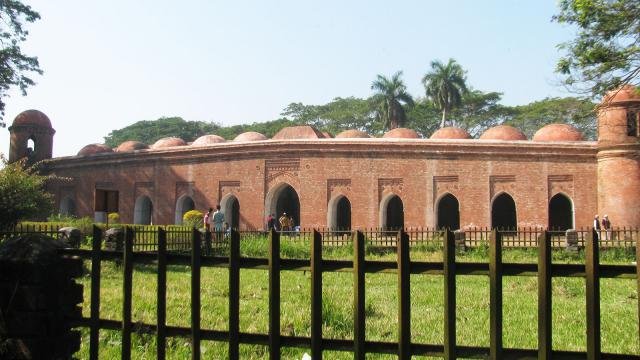
A mosque of unparalleled design There is no conventional roof in it. This means that we usually see the roof that is equal or sloping, it is absent. The ceiling is semi-dimensional and rectangular domes. That is why it was called 'Chhadgumbh' Mosque. After being transformed into time, it has become 'sixty-five'. In fact, there are more than 60 dome in this mosque.
This is the Imam of the Shatgumbad Mosque. Helal Uddin explained. The reason behind this is that he tales some historians quoted as argument.
The location of Shatgumbad mosque in Sundergghona village on the north side of Khulna-Bagerhat highway, seven kilometers west of Bagerhat city. This mosque, the unique architectural style of the Sultanate period, is one of the attractions of Bagerhat city. In addition to sixty bees, Hazrat Khan Jahan (R) constructed numerous mosques, dighis and structures.
The historians think that the old Khalifatabad town is very old, today's Bagerhat is Bagerhat. The world famous Forbes magazine lists the 15 cities in the world that have lost, including the city's name. UNESCO's Education, Science and Culture Organization, UNESCO, lists the architectures of Khan Jahan with the Shatgumbad Mosque as the historic mosque city of Bagerhat in 1985.
Although the name is 'Shatgumbuj', the total dome is 81 in the mosque. Many of the historians believe that due to these 60 khambas the name of the mosque is 'sixthkhamaj'. And the term Khambaz evolved into the name of 'sixty-domes'. Again, seven times the number of dome, 'Satgumba' and the development of time has also been known as 'sixty-domed'.
Unrivaled design
In the mosque, 21 quarters of seventeen queens can earn as many as three thousand prayers. There is a separate place for women's prayers. This information proves the magnitude of the mosque. But there is no shortage of light and air in such a large mosque; Due to unique design, artificial light and air are not required.
The length of 168 feet in length and 108 feet in width is thick 8 feet high. There are six small and one big arches on the north and south sides of the mosque. On the east there is a large and five small arch on both sides.
The 60-pillars or pillars made of stone in the shrine are made of stone. The main components of the whole mosque are lime, tar, black stone and small bricks. The architecture of this mosque is typical of Tughlaq (Turkey) architecture in Central Asia.
Golam Ferdous, a custodian and researcher from the Bagerhat Museum of Archeology, said, "When Khan Jahan (RA) constructed the Shatgumbad Mosque, there is no correct date of mention. However, this archaeological evidence of the architecture of the Sultanate period.
Khanjahan's true identity
In addition to sixty bees, there are no namespace in any of the remaining buildings of the city of Khalifatabad. In the shrine of Khan Jahan (RA) only, his inscription has a name written on the date of death. It is said that the inscription was made by Khan Jahan (R) himself in his lifetime. After his death, Piraloli Taher, his associate established it.
In that inscription, the name is written in 'Khan-ul-Azam Ulugh Khan-i-Jahan'. 'Khan-ul-Azam' is the title given by the ruler. It is believed that Feroze Shah Tughlaq, the then Delhi ruler, gave the title to Khan Jahan (RA) for his outstanding contributions to the army. Khan-i-Jahan is also his title. He took the title as a follower of Chistia. His real name is 'Ulugh Khan'. And there is no 'Ali' with the name of Khanjahan (RA) in the inscription. Researchers believe that the name has become Khanjahan Ali (R).
The British government took the initiative to preserve the archaeological heritage of the city of Khalifatabad with six hundred year old sixty-six mosque, in 1904. Then in 1913 the Shatgumbad Mosque was made in 'Calcutta Gazette'. According to the Department of Archeology, the first reform work of Shatgumbad Mosque was made in 1923. Last year, under the South Asian Tourism Infrastructure Development Project, Shatgumbad Mosque has been renovated.
This post has received a 0.35 % upvote from @drotto thanks to: @polash2.